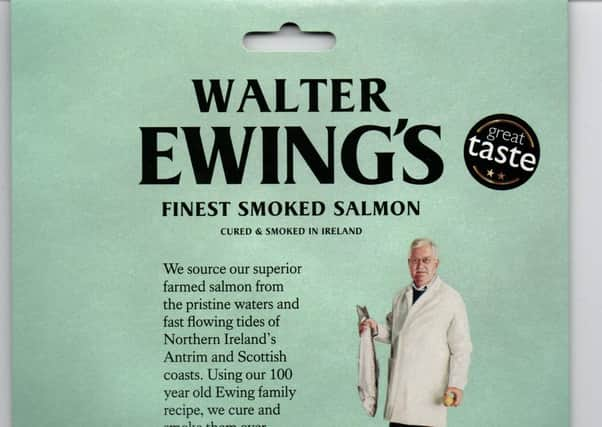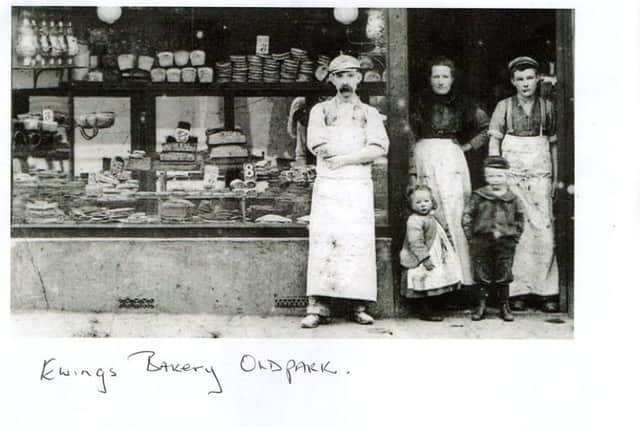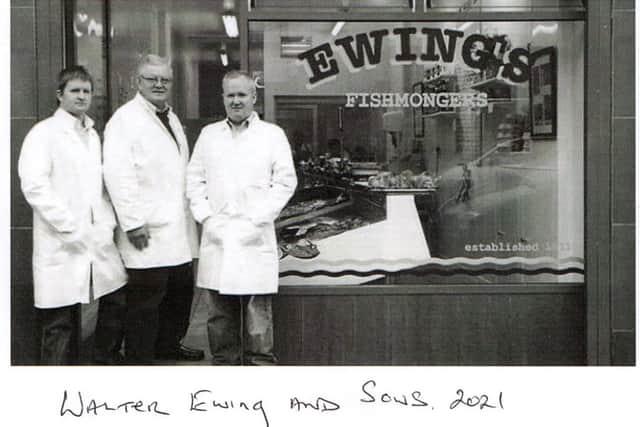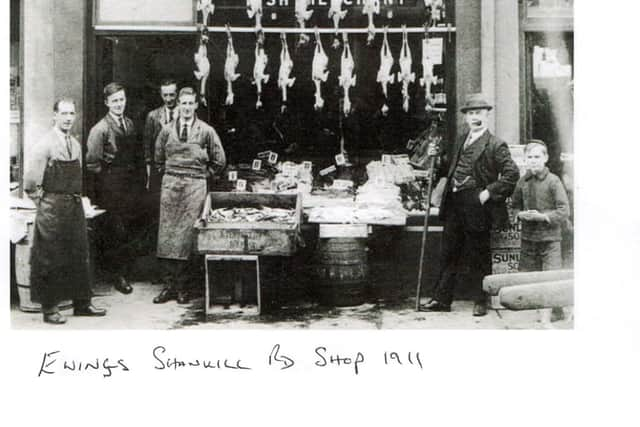A look back at the old fishmarkets


The building was built in red brick with arches and a drive through facility resembling St George’s in appearance.
The tenants during the inter war years and latterly were Ewings, Owen O’Hagan, Nolans, Arthur Tempest, Harry James and Keenans.
Advertisement
Advertisement
Fish were often sourced from Aberdeen, Peterhead and the three main local ports, Ardglass, Kilkeel and Portavogie with deliveries by lorry and locally horse and cart. The cases were wooden and the lids nailed down unlike the modern plastic containers.


When in 1911 Ewings were established the four brothers of Granda Ewing had ten shops - Lisburn Rd, Antrim Rd, Cherryvalley, Stranmillis, Crumlin Rd, Old Park, Woodvale, Shankill (two) and York Rd which was blitzed during WW2. The management was supported by Sandy Smith and Aunt Haywood. Walters brothers Matthew, William, Bob and Jimmy have all been fishmongers and currently Walter and his two sons run the business.
Walter’s first modes of transport were a blue Morris Minor van and a bicycle with a basket and name plaque. Wardes transport with a three wheeler vehicle brought the fish from Belfast port or the local harbours. During the workers strike in 1974 the landings were sourced at Donaghadee from Portpatrick.
The firm has twelve delivery vans and twenty six staff nowadays and lists Smoked Salmon, Willicks, Pollan, Hake, Cod, Smokies (Hot Haddock), and Potted Herrings garnished with vinegar spice and onions as favourites with Haddock and Whiting used for fish and chips. Speciality fish are sourced from Aberdeen, Peterhead, Turkey, Oman, Greece and Sri Lanka. Ewings’ smoked salmon is processed in the Shankill Road factory using a fragrant mix of beech and oak wood chips and is world renown. When visiting the factory I was impressed with the aromas of herbs and spices. Clientel include Buckingham Palace, Hastings group, Roscoffs, 44, Selfridges, Sainsburys and Eurospar. However the current Brexit documents mean that two pallets of mixed frozen fish and Tiger Prawns from India are accompanied with a 72 page document. Ewings work Mon to Sat and have been on trade missions to Hong Kong, Dubai, Netherlands and Boston supported by Invest NI.
Advertisement
Advertisement
Keenan Seafoods (Kennedy Way), was established in the fish market in 1942 trading as T Keenan and Son Fish Merchants Ltd occupying an area overlooking Oxford Street. In those days customers included Sawyers Castle St - the best shop in town with contracts including hospitals and schools. Grandson Gerry, now the MD, relates that when herrings from Ardglass were filleted the offal was simply washed down the drain. Post war the Belfast Corporation decreed that toilets were not permissible in the markets due to hygiene so the staff took their comfort break behind the fish boxes!


The fish was always fresh with only fridges used and the catch was loaded unto lorries from GNR York Street and there was an ice house cold store facility in Gt Victoria St. The weekly throughput from all the merchants in the fish market was 50 tonnes and Gerry Keenan now considers Turbit, Halibut and Monkfish as premium species. During the troubles Keenans staff were socialising in Laverys Pub one evening when inmates from the prison ship docked in Belfast Lough during internment burst in dripping wet as they had swam up the lough. They suggested the patrons give up their overcoats and off they went presumably to the deep south. A month later Gerry’s father received a large package containing the dry cleaned coats with a £20 note and a letter of thanks from the escapees but no address was given! As I left Gerry’s factory the notice on the security gate read “We do not use wooden pallets” - a timely reminder!!
In latter days meat consumption was restricted by the RC church for lent and ever since the community has eaten fish on Friday from St George’s etc.
Keenans Seafood now has a throughput of 10 tonne of speciality fish per week with 30 staff. One tragedy of the industry is the fishing of Cod Roe (Cod with their eggs) which depletes the capacity to re-produce. The redevelopment of the markets in 1992 meant Ewings, Keenans and others relocating and continuing their success story.
Advertisement
Advertisement
Local fishermen in Ardglass, Kilkeel and Portaferry now catch Prawns, Norway Lobsters and Scampi, with Crabs and Lobsters an upmarket delicacy. In France and Spain NI shellfish are supreme. In the sea environment free dwelling fish are Herring and Mackerel and bottom dwelling Hake, Cod, Monkfish, Haddock, Plaice, Brill and Whiting. On a smaller scale fishermen use potting creels to catch Eels, Lobsters and prawns with winkles picked by hand. However the herring season is only three weeks long and the prawn season lasts from June to Sept with exports to France, Italy, Spain, and the Middle East. Nowadays large trawlers can carry five tonne of fresh fish and 25% of UK fishermen now claim incidents at sea. During WW1 six Kilkeel fishing boats were torpedoed by German U boats when tied up and more recently a local trawler off Donaghadee was pulled backwards by a sub until the nets were cut.


Angling is a favourite past time amongst locals and the humorous story is told of the Ballinderry joker George Henry Hull who was fishing the Ballinderry river and along came Rev J B Lowe. ‘Morning George, How many fish have you caught?’ ‘Your Reverence, If I catch this one and two more I will have three!’
Local fish enterprises add to the economy with Glenarm Salmon producing 600 tonne each year which is sold in 15 countries from Singapore in the east to San Francisco in the west and located in Glenarm Bay and Red Bay, Co Antrim. The Lough Neagh Fisherman’s Co Op is the largest producer of wild eel in Europe with 400t annually based in Toome and 500t annually of Pollen, Perch and Dollegan trout.
The eels are shipped to Holland for smoking and Billingsgate London for jellied eel. All species are also for sale locally.
Advertisement
Advertisement
In 2018 £25.2m of fish was landed in NI - Prawns £11.9m (5000t), Scallops £2.3m (1000t), Crabs £2.2m (1300t), Mackerel £2.3m (2400t), Herrings the silver darlings £1.8m (5200t), Haddock £2.1m (1600t), Monkfish £400,000 (200t), Cod £300,000 (100t), Hake £300,000 (100t). The industry is serviced by 246 boats from 7m to 30m long with 850 people employed rising to 2000 at peak time. In-house operations mean catch are landed, processed, sold and distributed at Ardglass, Kilkeel and Portavogie. With the new Fishing Act 2020 the UK set their own quotas and NI and the ROI was agreed a no fishing zone within six miles of the coastline. In conclusion as you enjoy your fish supper remember the trawlermen in high seas in all weathers and the spud men reflecting on that miracle in Galilee - the feeding of the 5000 with five barley loaves and two fishes!